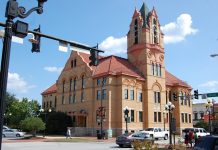By Stan Welch
Feral hogs were the center of attention at Tuesday night’s Anderson County Council meeting, as officials from the US Fish and Wildlife Service and Clemson University were on hand to discuss a pilot program designed to provide real hands on solutions to the growing problem.
Noel Myers, state director of wildlife services for the USFWS, explained that the feral hog program he has been running has received additional funding, allowing him to expand the program and make it more of a “boots on the ground” approach than a study.
“The focus of this pilot program will be more towards helping private landowners deal with this problem, which continues to damage agricultural interests, as well as residential properties.”
Myers stated that the feral hog population in South Carolina approaches 150,000 animals. “These animals breed amazingly well. The size of a group or family often doubles within just four or five months. The damage they do can be amazing. We went in and trapped a single grown hog that had done five thousand dollars worth of landscaping damage to a single home in a single night.”
While Myers was reluctant to provide a long term commitment to the proposed level of hands on involvement , he did say he expected the additional funding to be available in the short term. “Federal funding is always iffy, but the sense that this problem needs to be addressed seems very pervasive, especially in the USDA, which is providing some of the funding.”
He responded to questions from Council Chairman Tommy Dunn and Councilwoman Cindy Wilson concerning the possible adoption of a program currently underway in Georgia that brings hog hunters and property owners together. A citizen speaking during the public comments mentioned the program, which Myers said is a workable method, but not the only one.
“The issue of feral hogs is a complicated one. There is no magic pill. This hunting program is one tool. We are looking at trapping, hunting with dogs, night hunting and we are beginning to explore the use of poisons.”
Feral hogs are a non-regulated species, which means there are few, if any, regulations about killing or trapping them on private land. Night hunting is allowed from March to July but hunters must have a hunting license and inform SCDNR online of their intent to night hunt at least 48 hours in advance.
Mark Arena, of the Clemson Extension Service, told the audience, which included about twenty people who attended specifically to learn more about the program, that a program will be held on April 14th at Circle M BBQ on Martin Sausage Road in Liberty. The program will deal with feral hogs, coyotes and beavers, and how to deal with them. The cost is thirty dollars per person and will include a meal. The program begins at 5:30 p.m. and lasts three hours.
Those wishing to attend must RSVP to Renee Watson at 864-878-1394 by April 10th.
















